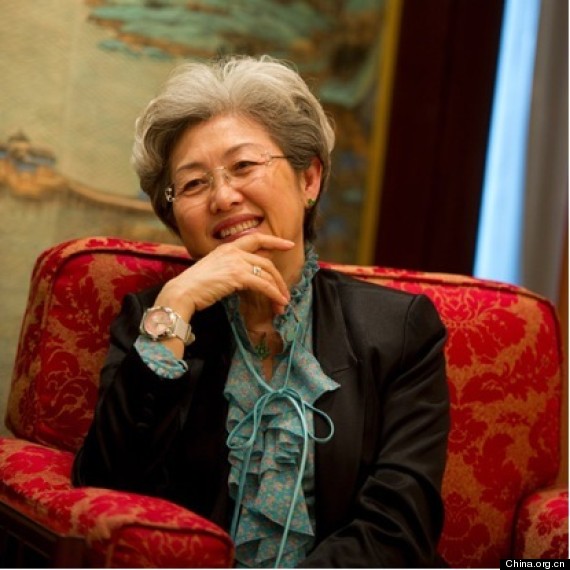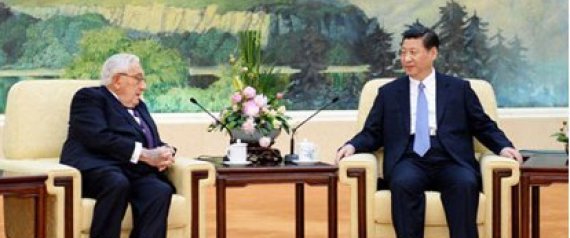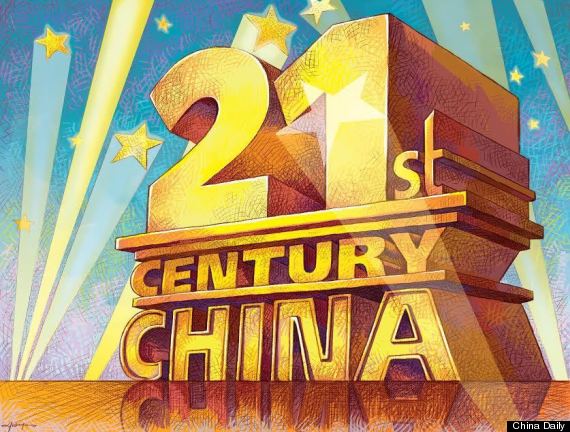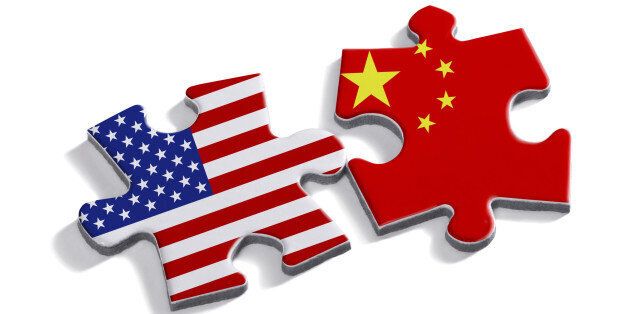Nathan Gardels is the editor-in-chief of Noema Magazine.
Henry Kissinger Talks to China’s “Iron Lady”
The meeting between Chinese President Xi Jinping and U.S. President Barack Obama earlier this month in Beijing resulted in a series of important agreements, including on climate change.
Against this background, The WorldPost has obtained exclusive permission to publish the following dialogue between Henry Kissinger and Fu Ying, which took place during a recent visit she made to the United States. Its candor and tone offer valuable insights into the thinking of these two important figures on the foreign policy of their countries.
Fu Ying — who was referred to as the “iron lady” during her time as China’s ambassador to the U.K. — is now the powerful chairperson of the Foreign Affairs Committee of the National People’s Congress of China. Henry Kissinger is one of America’s leading strategists and a former U.S. secretary of state.

Henry Kissinger: You’ve met many people during this visit to the U.S. What’s your impression?
Fu Ying: Yes, I listened to many people here as well as back in China and made some observations. The U.S. is at an interesting time. The 21st century is very different from the 20th. The U.S., though still the most powerful, can’t keep everything under its thumb. Watching the U.S., the word I can use is “anxiety.” It has so many problems of its own while trying so hard to handle many of the world affairs in the old way. This is not going to work and the U.S. needs to learn to adapt to the new world environment where the ground is shifting. In this changed world, countries have to work together, meaning accommodating and even making compromises when needed. The U.S. may need to change its way of looking at world issues.
Henry Kissinger: Indeed, the world has changed, and the U.S. is in a very unusual time. For a long period in history, the U.S. enjoyed absolute superiority and its foreign policy was based on such a premise. It is true that we are in a new century which is challenging for both countries. Not only for the U.S., for China, too, it’s a challenge, isn’t it?
Fu Ying: Yes, but very different challenges. For the U.S., it is the need to learn to work with equals. From my observation, the U.S., in its traditional world, had either allies that followed and relied on its support or enemies which should be fought and crushed. There were no equal partners like brothers. Has the U.S. ever had a brother?
Henry Kissinger: (laugh) No, I have not thought that way. You should write about this for more people to read and think.
Fu Ying: Yes, and thank you for saying that. Am I right to say that in the U.S. political culture, there is no such a concept of working with real equals? That’s one of the reasons why the U.S. finds it uncomfortable to deal with a country like China which is neither its ally nor enemy, and who wants to be treated like an equal partner as brothers would expect. This is not because China wants to get on a par with a power like the U.S. In China’s worldview, countries, big or small, should all live like brothers.
For China, the challenge is huge, too. To be, all of sudden, pushed to such a high world central stage and to be given so much expectation, the Chinese cannot but feel a certain bewilderment and have not yet grown into such a role. It is like a new actor on the stage with its back to the audience most of the time. For China as a country and for the people at large, it takes time to learn to be a world player and to play a bigger role. Most in the world do not see that and tend to examine China like looking at the old powers and misread China’s words and deeds. The pressure for China is to learn fast.
“The pressure for China is to learn fast.”
Actually, China just came out of poverty and its accomplishment is very basic. You can’t imagine how we were faring just 20 years ago.
I remember at that time how difficult it was for my family to cover the expenses, especially in the last few days before receiving the next month’s salary. Now the young in China are doing much better, but many of them still find it hard, especially in their early years, to achieve a decent life.
Henry Kissinger: Ordinary Americans don’t know what kind of life you came out of. They don’t know what the Chinese are thinking and what kind of life they are having. They see the Chinese are more and more wealthy and that China has become rich and powerful. So it will be more and more like the U.S. The younger generation of Chinese may take what they have for granted and place growing expectations on their government. Many people in the U.S. see the heating up of the China-Japan island dispute and China’s disputes in the South China Sea and feel worried. They think it’s because China wants more.
“I personally think what China wants is not to take over from U.S. China wants to be respected.”
I personally think what China wants is not to take over from U.S. China wants to be respected. But as China is getting more prosperous and strong, wouldn’t the desire to be respected grow stronger?
 Henry Kissinger meets Chinese President Xi Jinping in Beijing, April 24, 2013 (Chinese Ministry of Foreign Affairs).
Henry Kissinger meets Chinese President Xi Jinping in Beijing, April 24, 2013 (Chinese Ministry of Foreign Affairs).
Both China and the U.S. believe we are unique. The U.S. sees itself as exceptional. It’s above others and can do things it wants. China also believes in its cultural superiority. From an historical point of view, China for a long period of time believed it was the center of the world and had superior culture over others. Isn’t it true that its tributary relationship with neighbors in history was formed around China’s cultural superiority? So, for many, what will be the future of China remains an open question.
Fu Ying: China regarded itself as at “the center under heaven” only before geographical knowledge grew and proved otherwise. It was not based on pursuing world power.
It is true that in China there is lots of pride in its culture richness and influence which went beyond its boundary. But there is no such ambition in the Chinese culture to rule the world per se. Actually during that time, the Chinese knew little about the outside world and had not much interest.
Expansionism finds no place in the Chinese cultural thinking. China’s door was forced open by the imperialists during modern times. Now China has grown fast and has risen above the level of subsistence, but far from reaching the living standard of Americans. China confronts many difficult challenges at home.
The American lifestyle is quite extravagant and not all the rest of the world’s population can live luxuriously that way, as the earth would find it difficult to support. Since China’s leaders are well-experienced, including having worked at the grassroots level, they are fully aware of how the country is doing and what the people want. Compared with the international issues, the domestic issues, though very tough, are relatively predictable and within sight. The challenges at the world level are very new not only for the leaders, but also for the general public as there has been no precedents.
But we have to all face this crucially important choice, that is, do we bring the 21st century to peace or to conflict? Are we capable of keeping peace? The history of international relations has not seen a century without wars, has it?
Henry Kissinger: There was a period, between 1815 and 1915, for 100 years, there was no big war. It was after the French Revolution when leaders of all major countries wanted peace. By meeting regularly and by keeping to dealing with problems through negotiations, they overcame the risks of wars and managed to have kept peace. Do you think the U.S. and China will go to war?
Fu Ying: That’s a very serious and important question. In theory, I think, the possibility of a world-scale war is small as countries are economically highly interdependent. There is too much at stake. More importantly, in a globalized world, countries can reach resources, market, capital and technologies without resorting to means of war. There is no longer the urge to war for economic gains. Besides, the form of war is no longer the same as the world has seen. Modern science and technology have advanced so much that the new means of war can easily go out of control. Just through the Internet a country, or even the world, can be brought to [a] standstill and even risk paralysis. The danger now, I think, is that there are still people who think war can be an option for solving differences among major countries.
Henry Kissinger: Not all wars in history had economic reasons. Now, though it may be unlikely that the major countries would fight each other, the risk of war still exists.
Looking at Europe in the decade prior to World War I, though there was no war, crises were occurring almost every year. People got used to it and tended not to pay much attention to them until they grew out of control and led to war.
“The danger now is that countries when issuing a threat may not know how to get out of it in a face-saving manner.”
Now if crises are not addressed in a timely and proper way, they still can go out of control and lead to war. The danger now is that countries when issuing a threat may not know how to get out of it in a face-saving manner. From my experience, if some country tries to play a game between the U.S. and China, we need to keep a sober mind about it and not be manipulated.
THE CHINA VS. JAPAN DISPUTE
Fu Ying: Yes, some countries are good at swing between big countries. But I think the problems themselves are manageable. The real issue that should be watched carefully is the Japanese prime minister who has made a big story out of the Diaoyu Islands dispute and exaggerated it into a major military threat from China to Japan. He wants to use it as an excuse to adjust security strategy and even to amend Japan’s peace constitution.
“If the U.S. does not see the risk and gets dragged in just because it is an ally [of Japan], that would affect how the trend goes and how every party judges the situation.”
If the U.S. does not see the risk and gets dragged in just because it is an ally, that would affect how the trend goes and how every party judges the situation. Some senior politicians from the U.S. made comments tinted with emotion and not well thought over.
During my visit in the U.S., many questioned China’s handling of maritime issues to which I gave explanation. But I found most people made their conclusion without even checking on the facts. It shows that China needs to speak up more. There is a big gap in perception of China’s status. Americans overestimated China and got into a kind of anxiety syndrome about China trying to overtake U.S. preeminence, which is least on the mind of the Chinese. On the Chinese side, public perception of the U.S. is growingly negative. Because they see that whenever China got into some difficult situation caused by provocations from its neighbors, the U.S. would be on China’s opposing side, regardless of who started the trouble.
The U.S. is also found hurting China on many issues of interest and concern to the ordinary Chinese. It is also quite incomprehensible that U.S. politicians need to be critical of China in order to get votes. This negative mutual perception is not good if the two countries want to work together. So I think it is important to encourage direct communications including at the public level.
Henry Kissinger: This is indeed of big concern. The current imperative for the U.S. and China is to avoid visible conflict. Though on many occasions China was compelled to react to provocations, it should not give the outside world the impression that it is threatening its neighbors.
“Though on many occasions China was compelled to react to provocations, it should not give the outside world the impression that it is threatening its neighbors.”
One common challenge for our two countries is that can we join hands to work on certain things? This will be good not only for the two countries but also for world peace and stability. The U.S. and China need to seriously consider what they can do together. Just like the Trans-Atlantic relationship was brought closer through genuine cooperation after World War II, the U.S. and China may link up closer by cooperation.
“Just like the Trans-Atlantic relationship was brought closer through genuine cooperation after World War II, the U.S. and China may link up closer by cooperation.”
For example, we may find something new to do in northeast Asia. Of course it should not be in a way to make China’s neighbors uneasy. President Obama and President Xi Jinping proposed to build a “new model of great power relationship” on which I believe there are a lot more things that the two sides can do.
I understand the predicament of China. The leaders do not want conflict with the U.S. But when facing provocation, they need to react to challenges. The U.S., too, is in [a] predicament.
Many people do not even know where these disputed islands are on the map. Leaders in both countries are under the influence of domestic pressure as a result of media and Internet effects. Nowadays people take information from television screens and the Internet. Their way of thinking is not like in the past when learning things from newspapers and books. So we need to draw a line to separate the problems and to reduce the temperature. There are many important things the U.S. and China need to work on and we should not be distracted.
The U.S. and China also need to keep good communications not only about the current issues, but also on the strategies of two countries. Future cooperation can be better pursued with clear understanding of each other’s strategic direction.
For example, the U.S. does not need to use the South China Sea issue to threaten China. Modern strategists would not consider containing China by some small islands some hundreds of miles away from the mainland.

Fu Ying: Many difficulties in the China-U.S. relationship arise due to misperceptions. Therefore the two sides need to improve communications at both [the] strategic and public level to reduce misperception and cultivate trust and avoid strategic misjudgment.
I have heard many suggestions coming both from China and the U.S. about how the two countries should carry out some specific cooperation to give substance to the new type of great power relationship. I think, in order to put together some meaningful initiatives with sufficient impact, we need first to cultivate the habit and spirit of cooperation.
The Trans-Atlantic cooperation was, in essence, assistance by U.S. to support Europe — and you also had a common enemy at that time. The 21st century China-U.S. Trans-Pacific cooperation will be between equals and based on mutual needs. Its success takes not only proactive efforts from both sides, but also mutual accommodation and compromise when necessary.
“The 21st century China-U.S. Trans-Pacific cooperation will be between equals and based on mutual needs.”
Maybe we can identify some base lines of common interests and try to start working on them. Climate change is also of common interest. The key is real and equal cooperation in which there is give and take on both sides.




